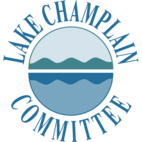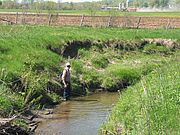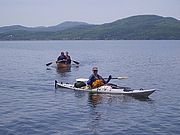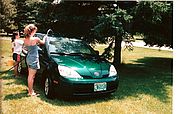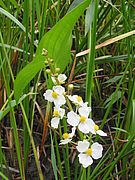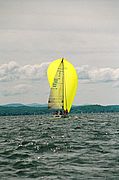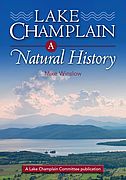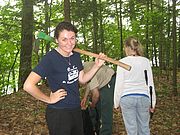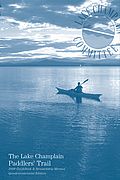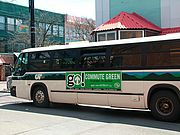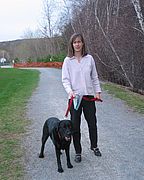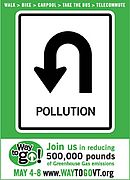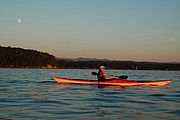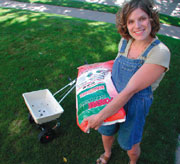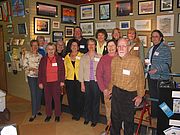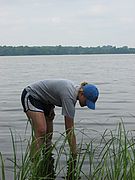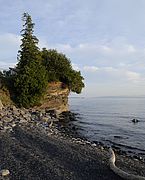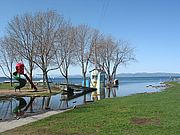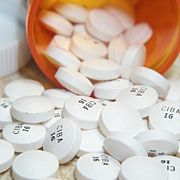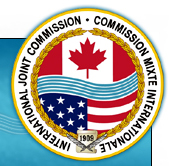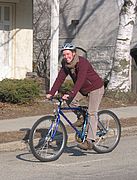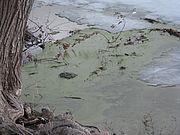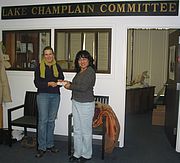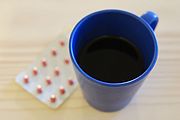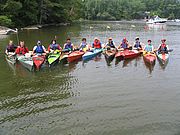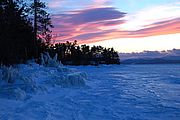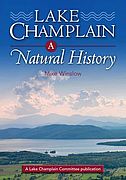LCC along with the Vermont Agency of Natural Resources (ANR) has recently completed our third year of monitoring at a stream restoration site on Rugg Brook in St. Albans. Rugg Brook is an impaired waterway that flows into St. Albans Bay. An LCC assessment of the stream in 2005 revealed a section with steep eroding stream banks. ANR then partnered with landowners Andy and Nicole LaPierre, the town of St. Albans and LCC to flatten the banks and allow flood waters to dissipate over the surrounding lands rather than continuing to erode them and carry sediment to St. Albans Bay. LCC has remained active in assessing the success of the project.
Over the last three years the stream has settled into a well-defined channel, vegetation has re-established at the site, and planted willows are thriving. This is in stark contrast to the first year following construction when there was extensive disruption. Vegetation had not yet established and the stream thrashed about in its floodplain, cutting off meanders and creating new channels. Sometimes conditions need to get worse before they can improve. Monitoring will continue for two more years. Read...
The 2009 Quadricentennial edition of the Lake Champlain Paddlers’ Trail and Stewardship Manual is out! This year’s edition includes new site descriptions, revised maps and a special section on cultural history. Join or renew your membership at a level of $40 or more and we’ll mail you the informative guide to the Trail’s 37 locations that provide access to more than 700 campsites. Read...
Washing the car on a sunny weekend afternoon is part of the typical suburban summer scene. But usually the dirt, grime, detergents, and greases from the car end up in the local waterway and eventually Lake Champlain. Here are some tips to make your car washing more lake friendly:
- Use a commercial car wash - water from commercial washes is treated before reaching streams and less water is used overall.
- Wash over permeable surfaces like grass or gravel rather than in the driveway.
- Reduce excess use of water by using a trigger hose and bucket.
- Dispose of leftover water in the toilet.
For more lake friendly tips, check out the Learn and Get Involved sections of our website and consider taking our Lake Protection Pledge. Read...
On land plants have developed elaborate mechanisms to ensure pollen passes from male flowers to female flowers through wind or intermediate pollinators and thus ensuring reproduction; water presents a different challenge. Pollen can not move through water as it can through air and the reliable insect pollinators are much less abundant. Most aquatic plants compensate by holding their flowers above the surface of the water. Once pollination has been completed the stem holding the flower might coil as in water lilies, pulling the flower down below the water surface and out of sight from seed and fruit predators.
A few plants actually pass pollen through the water. One such species is coontail, a common native underwater plant sometimes mistaken for Eurasian water milfoil. In this species, male flowers break off of the plant and float to the surface. Once there they drop pollen which sinks down onto the female flowers which remain below water. Despite the fascinating strategies that some species have developed, vegetative growth from existing plant material is still the most common form of reproduction. Read...
Get out on the water and support great lake-related causes - including the Lake Champlain Committee - by participating in the 2009 Regatta for Lake Champlain! The event kicks off Friday, July 24th from 7:30 pm to midnight at the ECHO Science Center in Burlington, VT with a Lake Lovers' Dance Party. In addition to great entertainment, food and drink, there will be many door prizes and a silent auction featuring a 4 day/3 night vacation at Andros Beach Club in the Bahamas and lots more. Tickets for the lake benefit are $15/person, or $25/pair (21 years and up) and can be purchased at the door or in advance from http://www.regattaforlakechamplain.org.
The Regatta Sailing Race will be held on Saturday, July 25th, at 11:30 am just outside Burlington Harbor. Awards for this family-friendly pursuit-style race are given for placement in various classes, the Largest All-Family Crew, Last Boat, Youngest Crew, All Female Crew, Oldest Boat, and Middle of the Fleet. The boat that raises the most sponsorship money wins a special prize for the entire crew. The "pursuit" race has a staggered start to eliminate the stress and jockeying of a traditional race. Participating boats are given a handicap based on the length of the course and the speed potential of the boat. Smaller boats start first. The appeal of the race is that it brings all the classes of boats to the finish line around the same time making for a fun and exciting conclusion! The Regatta is open to racer, cruiser, or daysailor sailboats. For pre-race party and race entry details, prize and award information, or to sign up a crew or sponsor a boat, go to www.RegattaForLakeChamplain.org.
Since 2004 the Regatta has raised over $40,000 for lake causes. Over $10,000 has been donated to the Lake Champlain Committee to support our water quality protection and lake access work. Read...
Lake Champlain: A Natural History has won an IPPY Award from Independent Publishers. The group recognizes the best independently published books of the year. Our book tied for silver for Best Regional Non-Fiction in the US Northeast.
If you haven’t gotten your copy yet or sent one on to a fellow lake lover, you can make a purchase today at our secure website www.lakechamplaincommittee.org or by calling us at 802 658-1414. Read...
New York State Electric and Gas (NYSEG) has completed removal of contaminated wastes for an upland area of a former manufactured gas plant on Saranac Street in the City of Plattsburgh. The plant operated from 1896 to 1960, and the contaminants were by-products of gas production. Over 150,000 tons of tar-contaminated soils and over 7-million gallons of contaminated liquids were collected and treated. At this time, proposals are being considered for Phase II of the project which will address contaminated river sediments. Read...
Join in a fun day of trail maintenance and hiking at beautiful Niquette Bay, one of the stops on the Paddlers’ Trail. Individuals and families with children 8 and up are welcome to help us get this popular network of trails ready for summer. Lunch will be provided. Come prepared with sturdy boots, gloves, water, sunscreen and bug repellant. Please register in advance with Jessica Ricketson at 802 879-5680 or jessica.ricketson@ state.vt.us so we’ll be sure to have enough food!
This maintenance project is a collaborative effort of the Vermont Department of Forests, Parks and Recreation, the Girl Scouts, American Hiking Society, No Child Left Inside, and the Lake Champlain Committee. Read...
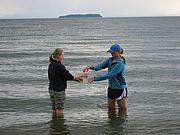
For the seventh consecutive year, the Lake Champlain Committee is coordinating a volunteer blue green algae monitoring program for near-shore areas of the lake. Citizen monitors collect water samples on a weekly basis which are analyzed by the University of Vermont. The program is critical to expanding knowledge of how, why, and when blooms form and what triggers them to turn toxic. It also provides data to public health agencies for posting about swimming safety. We need monitors to sample at Beggs Park in Essex, NY and High Rocks in Highgate Springs, VT. LCC will provide sampling equipment, training, and ongoing support. Willing volunteers need to be able to take water samples between 10AM and 2PM on Sundays or Mondays between July 6th and September 8th. LCC will arrange a Monday morning pick-up with the Essex volunteer. The High Rocks volunteer must deliver the samples to the Missisquoi National Wildlife Refuge Headquarters by Tuesday morning. Samples are taken in very shallow water, so a boat is not necessary so long as the volunteer has access to the shore. A short training session will be held on Monday June 29th. If you or anyone you know is interested please contact LCC staff scientist Mike Winslow at 802-658-1461 or mikew@ lakechamplaincommittee.org. Read...
The 2009 Quadricentennial edition of the Lake Champlain Paddlers’ Trail and Stewardship Manual will be mailed in June. Join or renew your membership at a level of $40 or more and we’ll mail you the informative guide to the Trail’s 37 locations that provide access to more than 700 campsites. Read...
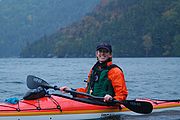
Even if air temperatures seem balmy, the lake takes much longer to warm up. Additionally, strong currents and the presence of springtime debris add to risks this time of year. Current Lake Champlain temperatures are in the 40s. If you are immersed in water that cold for a half hour, exhaustion and unconsciousness can set in. Water temperatures of less than 70 degrees Fahrenheit can cause you to lose precious body heat up to 25 times faster than comparable air temperatures. Water temperatures in many areas of Lake Champlain, particularly the Main Lake, never reach the 70s. Be cautious about heading out on the water and make sure you and your boat are properly equipped. Bring a weather radio or VHF with you and check the weather forecast repeatedly. Always wear a Personal Flotation Device (PFD). Nine out of ten drownings occur in inland waters, most within a few feet of safety. Most of the victims owned PFDs but died without them. A properly fitted, buoyant PFD can save your life, only if you wear it. Dress for the season. If kayaking or canoeing in cold water conditions (no matter what the air temperature is) wear a wetsuit or drysuit with an insulating layer. Here's to safe, fun adventures on the water. Read...
Over 3,800 individuals participated in this year’s Way to Go Week – an event to promote environmentally-friendly, healthy alternatives to driving solo. Thanks to everyone who joined in. Collectively we saved 254,633 miles of driving, 11,307 gallons of gas, over $23,000 in gas money, over $35,000 total in driving related expenses, 7,429 pounds of pollution and over 221,000 pounds of CO2 in just one week! Read...
Whether in the street, the park, or your yard, cleaning up after pets helps to keep the waters safe. Left unattended, pet waste leads to:
-Bacteria in the water that can close beaches and make people sick.
-Excess nutrients that cause algae blooms.
-Oxygen depletion when the poop breaks down.
What to do with the poop?
Flush It
The best option is to flush it down the toilet so it can be treated at the wastewater treatment facility or septic system.
Bury It
Burying the waste about 5” deep will allow soil micro-organisms to break it down while keeping the poop from being washed away by the next rainstorm.
Trash It
While not the best solution, putting pet waste in the trash is preferable to leaving it in place.
For more lake friendly tips, check out the Learn and Get Involved sections of our website and consider taking our Lake Protection Pledge.
Read...
On May 4-8, leave your car at home and join the fun!
Way to Go is an annual program co-founded by LCC to promote the use of cheaper, healthier, more earth-friendly alternatives to driving alone. Individuals, businesses, schools, organizations can all easily participate. Just pledge to get to work, school or play by walking, biking, carpooling, taking the bus or telecommuting at least one day in May. Sign up online and your pollution, gas and money savings will be calculated and you'll be entered into a drawing for great prizes – iPods, cordless electric mowers, snowboards, overnight stays, bus passes, and gift certificates! Whether you live in the Lake Champlain Basin year-round or just visit here occasionally, we hope you'll join in the event.
Read...
Reserve your copy by joining LCC or renewing your membership.
The 2009 Quadricentennial edition of the Lake Champlain Paddlers' Trail Guidebook and Stewardship Manual will be out in June. It includes Trail descriptions and chartlets, launch site locations, natural and cultural history articles and equipment check lists. - And it's available to all members who renew annually for $40 or more.
Read...
The spring weather has many of us poring over seed catalogues and hankering to get out gardening. Here are a few "clean lake" tips to follow to ensure that the investments you make in your property stay there rather than running off into the lake:
Don't apply fertilizer in the spring. Early fall is the best time to fertilize in the Champlain Valley. So hold off on adding anything to your soil now and use the time instead to get a soil test done so you know what - if anything your soil needs. Contact Cornell Cooperative Extension in New York and UVM Extension in Vermont to obtain soil test kits.
Don't use fertilizer with phosphorus. Studies indicate that the majority of northeastern lawns have more than enough phosphorus. If you do use fertilizer, make sure to buy a bag of the phosphorus free stuff. The three numbers on the fertilizer bag indicate the Nitrogen (N), Phosphorus (P), and Potassium (K) content. A "zero" in the middle means it is phosphorus-free. Lawns rarely need extra potassium (K) but adding some won't affect water quality.
Plant grass seed on existing lawns in the fall and spring. Use a grass mixture that does well in the area and leave legumes, such as common white clover, among the grass to add nitrogen to your lawn naturally. These practices will encourage strong root growth and enable the grass to outcompete weeds.
Mow to maintain a height of 3 to 4 inches. Cut off no more than 1/3 of the grass blade and leave the clippings on the lawn to add nutrients and organic matter.
Sweep any clippings and fertilizer off paved or hard surface areas. This will keep nutrients on your land instead of in the lake. Read...
On April 2nd Phoenix Books and Café played host to a celebration of Lake Champlain in words and pictures attended by about sixty people. The event was a collaboration between LCC, the bookstore and the Essex Art League. Lake paintings by over 20 artists, poetry by award-winning author Daniel Lusk, and natural history from LCC’s roving scientist Mike Winslow were served up with delicious refreshments. If you missed the opening, you can still view the lake art at Phoenix Books until the end of May. If you have an idea for a lake program you’d like to organize in your community, please get in touch with us at lcc@ lakechamplaincommittee.org. Read...
LCC is gearing up for another monitoring season and are in search of blue green algae monitors for St. Albans Bay and possibly Missisquoi Bay. These locations often have the highest density of algae blooms, so they’re important to maintain. We may need additional volunteers later in the year so please stay tuned. LCC will provide sampling equipment, training, and ongoing support. Willing volunteers need to be able to take water samples between 10AM and 2PM on Sundays or Mondays between June 30th and September 1st and deliver them to a designated drop-off location. Samples are taken in very shallow water, so a boat is not necessary as long as the volunteer has access to the shore. If you’re interested, please contact LCC Staff Scientist Mike Winslow at 802-658-1461 or mikew@lakechamplaincommittee.org. Thanks! Read...
We have a whole series of lake lectures, natural history discussions and outings planned for spring and summer. Click on the title above to see what’s happening in May or check out the LEARN section of our website for upcoming events and other lake information. If you’d like to schedule a presentation about the lake for your community, please contact us at lcc@lakechamplaincommittee.org.
If you’re unable to attend any of our programs, you can easily add to your lake knowledge by purchasing “Lake Champlain: A Natural History” from our secure online store. The 160-page publication covers the lake’s geology, geography, biology and ecology in an accessible, engaging style.
Read...
Early spring to mid-summer offers opportunities for observing spawning behavior in many of the small common fish species of Lake Champlain. There are about 28 minnow species that occupy the lake ranging from tiny shiner species that rarely get more than 2.5 inches long to the common carp which may grow up to 25 pounds. Each species has distinctive habits and behaviors. Read...
Snowmelt-filled rivers and streams lead to rising lake levels this time of year. Additionally, plants can’t readily absorb any rain that falls before the flowers blossom and trees leaf-out so it moves fairly rapidly to the streams. On average, the lake’s level climbs almost three feet between the beginning of March and early May, peaking at about 99 feet above sea level. As of March 26, 2009 the lake stood near 97.5 feet. Read...
Looking for a safe, environmentally benign way to dispose of the unused or expired medications collecting in your medicine cabinet? You can drop them off at the Kinney Drugs store at 308 Shelburne Road in Burlington, Vermont on Saturday April 4. Another collection day will be held in the Plattsburgh, New York area later in the year. All drop off materials will be sorted by pharmacists and then either properly destroyed by law enforcement agents or disposed of at a federally licensed facility. By dropping off pharmaceuticals at a Medicine Collection Day you can help prevent accidental poisonings, substance abuse and environmental pollution. The event is free and open to the public. Read...
One hundred years ago, the world’s first international environmental agreement was signed between the United States and Canada – the Boundary Waters Treaty of 1909. This agreement created a body, the International Joint Commission (IJC) to mediate disputes over waters that crossed between the two countries. At the time, water diversion projects in North Dakota and Alberta along the St. Mary’s and Milk Rivers were creating tensions. There was also debate about potential hydroelectric generation along the Niagara River, shared by New York and Ontario. Most of the IJC’s work revolves around the Great Lakes. However, since Lake Champlain shares a border between Quebec and both New York and Vermont, it too is under the jurisdiction of the IJC. In their century long history the IJC has been called on to address Lake Champlain issues at least four times. Read...
Help us reduce 500,000 pounds of greenhouse gases in just one week! Way to Go Week is an annual program promoting the use of cheaper, healthier, more earth-friendly alternatives to driving alone. You can help make a difference in our air and water quality by walking, biking, carpooling, telecommuting or taking the bus. Do it for one day, a few days or the whole week. Sign up online at www.waytogovt.org. The website contains lots of useful information on reducing the environmental impact of driving. LCC Office Manager Jeanne Stark is one of the "commuter idols" highlighted on the website for getting around in a low-impact way.
Whether you live in the Lake Champlain Basin year- round or just visit here occasionally, we hope you'll join in the event. You can register online and get your pollution, gas and money savings calculated, receive free giveaways and be entered in a drawing for premier prizes including Ipod Nanos, Burton snowboards, battery-powered mowers, bus passes, and gift certificates!
Read...
Algae blooms are usually considered a thing of summer, but some algae populations will grow while still under the ice. So long as light is able to penetrate the snow and ice over the lake, algae can take advantage of it. The group of algae best suited to take advantage of the under-ice environment is the diatoms, species encased in beautiful microscopic silica shells. Nuisance summer blooms of blue-green algae are still months away. Read...
At a time when budgets are tightening throughout the country, University of Vermont students are generating revenue for local causes while getting a trial run at becoming an entrepreneur. Read...
On February 12th, the US Geological Survey publicly released a report on the presence of a variety of man-made chemicals in the streams and wastewater that discharge into Lake Champlain. The chemicals found include pesticides, fire retardants, fragrances, detergent degradates, and caffeine. Read...
What was travel writer Peter Greenberg thinking in calling Lake Champlain a "must miss" destination? Read...
The most recent issue includes information on forage fish declines, South Lake initiatives, how Burlington is dealing with stormwater, pending legislation on paddling fees, and more. Read...
LCC's new book called "Lake Champlain: A Natural History" was recently published to coincide with Lake Champlain's Quadricentennial celebration. The book will expand the knowledge and appreciation of anyone who visits, works, or plays around the lake. Read...
